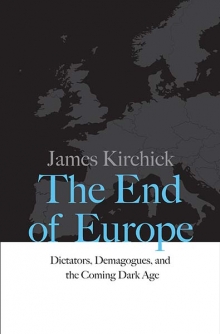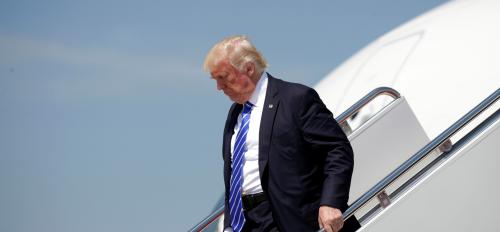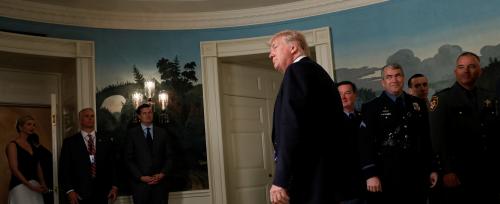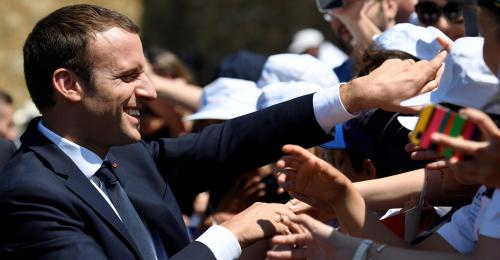Helmut Kohl’s passing is a reminder of how far Germans have come in the past two decades, writes Constanze Stelzenmüller. Without him, she argues, none of it would have been possible. This post originally appeared in the Washington Post.
Helmut Kohl, Germany’s chancellor from 1982 to 1998, will be doubly remembered by history as one of its greatest leaders and also one of its most flawed. For a generation of Germans, his towering and darkly ponderous frame seemed to literally embody his center-right Christian Democratic party (CDU) and later the country itself—in both the best and the worst ways. His era ended long before his passing last week at the age of 87. Yet the news is a reminder of how far we Germans have come in the past two decades; without him, none of it would have been possible.
In some ways, the “Chancellor of Unification,” as he is often reverently called, was simply a remarkably lucky man. Ronald Reagan’s determination to reverse the post-war division of Europe, the sclerosis and corruption of the Eastern Bloc, Solidarnosc in Poland and the Velvet Revolution in Prague, the sheer bloody-minded courage of East Germans marching every Monday night with candles in their hands despite armed police massed in the side streets and the Soviet Union’s leader Mikhail Gorbachev’s insight that it was time to fold: All these events came together miraculously in 1989 to achieve what had seemed impossible, even unthinkable for 40 years—the opening of the Berlin Wall.
But Kohl was the proverbial politician who envisioned two grand goals, and once he realized they were within his reach, he pursued them relentlessly and singlemindedly: ending the partition of Germany and liberating Europe. His Western European peers, French President François Mitterrand and British Prime Minister Margaret Thatcher, were appalled at this prospect, fearing that it would resuscitate the German Question—creating a massive power imbalance in Europe in favor of the reunited country—and labored mightily to prevent it.
Kohl, a committed trans-atlanticist, simply went over their heads to Washington. He recognized that U.S. President George H.W. Bush and his advisers James Baker III, George Shultz and Condoleeza Rice understood, as he did, that this was a historic chance to accomplish the dream of a Europe whole, free and at peace. His greatest achievement, however, was winning over Mitterrand and Thatcher by agreeing to a further round of European integration (including forgoing the strong Deutsche Mark for a common currency, the euro)—and thereby binding Germany’s fate irrevocably to Europe’s. It transformed the continent and secured him a place among his country’s greatest statesmen of all time.
Yet he left public life—actually, he had to be forced out—with his reputation tarnished and diminished. Germans from both sides of the former border were angered by his airy promise in 1990 that East Germany’s landscapes, ravaged by mining and pesticides, would soon be transformed into “flowering meadows“ at no cost to the German taxpayer. The actual bill for unification has been estimated at 2 trillion to 3 trillion euros. It was worth every cent.
In 1998, Kohl lost an unprecedented bid for a fifth term to Gerhard Schröder, the leader of the center-left Social Democrats, after 16 years in office. He ceded the CDU leadership to others; its secretary general was now one Angela Merkel, his former protegee and still an almost-unknown young East German scientist-turned-politician. Yet Kohl, the quintessential operator, remained the party’s all-controlling grey eminence. Or so it seemed.
A year later, he found himself embroiled in a party financing scandal. The CDU had been accepting undisclosed donations (including from an arms dealer) and maintaining secret slush funds. An entire machinery of entrenched cronyism and corruption was laid bare. As Kohl prevaricated, blustered and feinted, half a dozen young conservative “warlords“ were circling him warily. But it was Merkel who felled him with a lethal bite to the jugular: She penned an article on the front page of a national newspaper calling for the party to drop him. A breathtaking act of political risk-taking, it made her the leader of the pack. In 2005, she was elected chancellor.
Increasingly ill and frail, Kohl mostly withdrew from public life, emerging only for infrequent interviews that were notably combative; he was a man who brooded lovingly over grudges. The Nobel Peace Prize for the European Union in 2012 was a rare source of satisfaction. Some might have said he would have been just as deserving a candidate, flaws and all.
As Germany prepares to bury the chancellor of unification, his former pupil Merkel is seeking a fourth term in elections on Sept. 24. The combined effect of Trump, Brexit and Marine Le Pen has made Germans, who had appeared to be yearning for a change of leadership, more appreciative of her unflappable demeanor; at this point, she looks likely to win. The challenge she will return to is formidable: preserving Kohl’s historic legacy by defending a European project in crisis and under attack.
For my generation of West Germans—we were in our mid-20s when the Wall came down—reunification was a gift of history dropped in our laps. Our new fellow citizens from the East, who had taken much greater risks, were paying a much higher price for their freedom: They were restarting their lives. Thirty years later, we are one country and have learned the value of the gift. Now we must be ready to defend it.










Commentary
Helmut Kohl: A great and flawed statesman
June 22, 2017